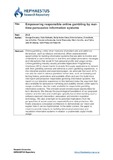| dc.contributor.author | Drosatos, George | |
| dc.contributor.author | Nalbadis, Fotis | |
| dc.contributor.author | Arden-Close, Emily | |
| dc.contributor.author | Baines, Victoria | |
| dc.contributor.author | Bolat, Elvira | |
| dc.contributor.author | Vuillier, Laura | |
| dc.contributor.author | Kostoulas, Theodoros | |
| dc.contributor.author | Wasowska, Sonia | |
| dc.contributor.author | Bonello, Maris | |
| dc.contributor.author | Palles, Jane | |
| dc.contributor.author | McAlaney, John | |
| dc.contributor.author | Phalp, Keith | |
| dc.contributor.author | Ali, Raian | |
| dc.date.accessioned | 2021-03-23T13:32:32Z | |
| dc.date.available | 2021-03-23T13:32:32Z | |
| dc.date.issued | 2018-05 | |
| dc.identifier.issn | 2151-1357 | |
| dc.identifier.uri | http://hdl.handle.net/11728/11784 | |
| dc.description.abstract | Online gambling, unlike other mediums of problem-atic and addictive behaviours, such as tobacco and alcohol, offers unprecedented opportunities for building information systems that are able to monitor and understand a user's behaviour in real-time and adapt persuasive messages and interactions that would fit their personal profile and usage context. Online gambling industry usually provides Application Programming Interfaces (APIs) meant mainly to enable third-party applications to network with their gambling services and enhance a user's gambling experience. In this industrial practice and experience paper, we advocate that such API's can also be used to retrieve gamblers' online data, such as browsing and betting history, promotions and available offers and use it to build more intel-ligent and proactive responsible gambling information systems. We report on our industrial experience in this field and make the argument that data available for persuasive marketing and usability should, under specific usage conditions, also be made available for responsible gambling information systems. This principle would provide equal opportunities for both directions. We discuss the psychological foundations of our proposed solution and the risks and challenges typically found when building such a software-assisted intervention, persuasion and emotion regulation technology. We also shed light on its potential implications from the perspectives of social corporate responsibility and data protection. We finally propose a conceptual architecture to demonstrate our vision and explain how it can be implemented. In the wider context, the paper is meant to provide insights on building behavioural awareness and regulation information systems in relation to problematic digital media usage. | en_UK |
| dc.language.iso | en | en_UK |
| dc.publisher | IEEE | en_UK |
| dc.relation.ispartofseries | 12th International Conference on Research Challenges in Information Science (RCIS); | |
| dc.rights.uri | http://creativecommons.org/licenses/by-nc-nd/4.0/ | en_UK |
| dc.subject | Persuasive Information Systems | en_UK |
| dc.subject | Responsible Gambling | en_UK |
| dc.subject | Corporate Social Responsibility | en_UK |
| dc.title | Empowering Responsible Online Gambling by Real-time Persuasive Information Systems | en_UK |
| dc.type | Article | en_UK |


